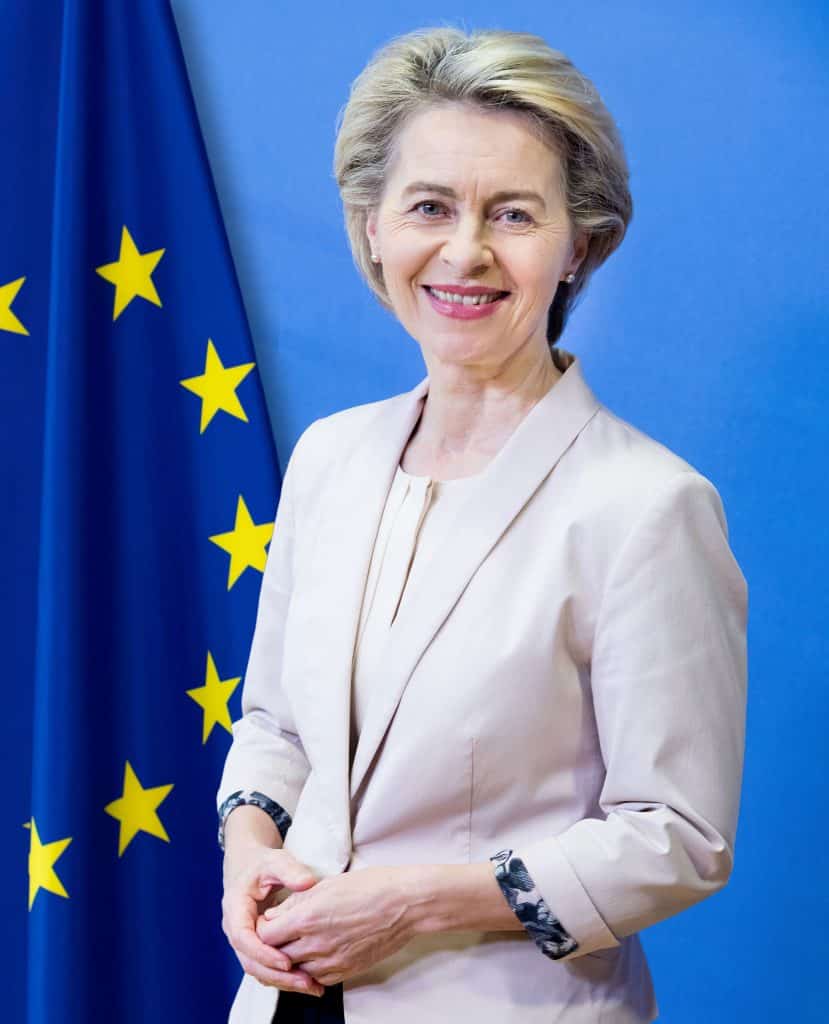Sven Lilienström
Founder of the Faces of Democracy initiative | Faces of Peace
“We need to remain vigilant when fundamental rights and the rule of law come under attack”

Dr. von der Leyen, you have been President of the EU Commission since December 1, 2019. The very first question we would like to ask you is: How significant are democracy and democratic values to you personally?
They are essential part of who I am and what I believe in, not only as a politician but as a human being. I grew up in a divided country: when I was a student in West Germany, East Germany was under authoritarian rule. I knew that people my age, on the other side of the wall, were not free to speak their mind, to demonstrate, to be themselves. And I knew that my parents, too, had lived under a dictatorship during their youth. I have always felt very lucky to be born in a blessed generation when it comes to personal freedoms and true democracy. I have also learnt that democracy can never be taken for granted. It is a seed that every generation must cherish and nourish. It is our responsibility to protect our democracies, and to improve them.
Crises are increasingly becoming a stress test for democracy – in Europe too. What challenges does our continent face in future, and are democracies actually able to manage them effectively?
Our response to the pandemic shows that a Union of democracies can deliver on its citizens’ needs. Look at all that we have achieved together. More than 75 percent of adults in the EU are fully vaccinated. By procuring our vaccines together, we made sure that all European countries had equal access to them. Meanwhile, we have exported as many vaccines as we delivered to Europeans – becoming the pharmacy of the world. No autocracy has achieved the same results. The same goes for our recovery plan, and for the European Green Deal. Democracies can manage any challenge effectively. Because in democracies, citizens contribute to solutions with all their strength and creativity. Because democracy is what we make of it. Every day anew.
“Fit for 55”: By 2030 the EU wishes to reduce its CO2 emissions by 55 percent – Europe’s “man-on-the-moon moment” on the way to delivering the Green Deal for a climate-neutral continent by 2050. How green will Europe become?
The Member States of the European Union have decided in a democratic process that Europe will be the first climate-neutral continent. We want to reconcile economic growth with our planet’s health. What is new is that we now have a roadmap to reach this goal, measure by measure, sector by sector, target by target. We have a roadmap towards zero-emissions cars, and to step up our production of clean energy. We have a Social Climate Fund, to cut energy bills for vulnerable households. And with our recovery plan, NextGenerationEU, we have unprecedented investment to help us achieve our climate goals – from home renovations to high-speed trains. Nine out of ten Europeans are asking us to act on climate change – and we are delivering on their expectations.
With the “European Democracy Action Plan,” the EU Commission intends to strengthen media freedom and pluralism and counter disinformation. How dangerous is fake news to democracy in Europe?
The pandemic has shown that disinformation can cost lives – literally. Information is a public good: our health, our economy, and the very functioning of our democracies rely upon it. Online platforms need to do more to fight disinformation – and we want to make sure they do so, with our Digital Services Act and by calling for a strengthened Code of practice on disinformation. Last month, we put forward a recommendation to give journalists better protection and announced a Media Freedom Act. Because democracy can only thrive if freedom of information, freedom of expression and media freedom are upheld.
Keyword “gender diversity”: You are the first female leader of the EU Commission, Kamala Harris the first female US Vice President. Do we need a women’s quota, and would such a quota really deliver greater equality?
We must strive for a system where women can always reach for the top, if this is what they want. The first step for this is to give equal opportunities to women and men. And for this, we are working to ensure quality education for all girls and women, to ensure parental leave for mothers and fathers alike, to guarantee equal pay for women, and to strengthen childcare. We have created, for instance, a Child guarantee, so that children in need have effective and free access to early childhood care and education. All parents, from all social backgrounds, should be able to send their kids to childcare and school. This is women empowerment at its most basic. As President of the European Commission, I have put up a team that is fully gender balanced. Yet today, fewer than 7 percent of top companies’ CEOs are women. So yes, years ago in Germany I have pushed for quotas for women on board. And it worked. Clearly, we need to incentivize companies and organizations to open up and give women their fair chance. We simply cannot exclude half of our talents from leadership positions.
Many young people take a democratic, peaceful and united Europe for granted. How can we enthuse young people about the European idea, or put another way: Why is Europe “nice”?
Europe is simply the best place to live in the world. In no other place in the world young people enjoy the same opportunities to study, to travel, to be entrepreneurs, and the same social protections. And in no other place young people enjoy such a broad set of rights and freedoms. This is what makes us who we are, and why we need to remain vigilant when fundamental rights and the rule of law come under attack. Europe must always remain a place where free speech is sacred, where all are equal before the law, and where everyone is free to love those who they wish. And one of our roles, as European Commission, is precisely to be the guardians of these fundamental values, which are guaranteed by the European Treaties. But we can only be successful if all European citizens – young and old – fight with us every day for these freedoms.
Dr. von der Leyen, our seventh question is always a personal one: Where do you feel at home – in Belgium, Germany or everywhere in Europe?
I was born and grew up in Brussels, I spent my teenage year and most of my political career in Germany. I feel at home in both of these places. Europe is my longing and I am a true citizen of the European Union. But ultimately, home is where my family is. We are a big family – with my husband, seven children, and a granddaughter too! I live in Belgium now, they are in Germany and across Europe. During the lockdowns, we tried to meet virtually every week. But it is not the same as being all together. Our family reunions – that’s when I truly feel at home!
About the Faces of Democracy and Faces of Peace initiatives:
To date over 1 million people in 50 countries have signed the online commitments of the Faces of Democracy and the Faces of Peace. More than 100 prominent figures from the world of politics, science, media, business and society are now committed to our democratic achievements – including numerous heads of state and government, Nobel Peace Prize Laureates, the publishers and chief editors of leading media publications and the CEOs of international companies. The Faces of Democracy initiative is now in its fifth year of existence.

